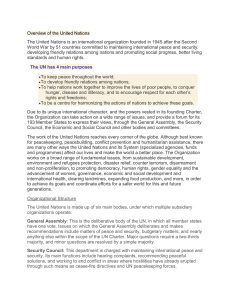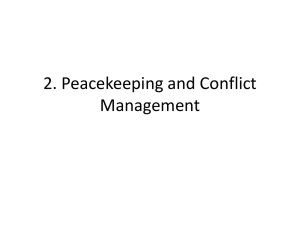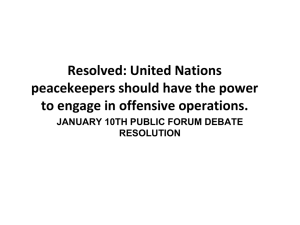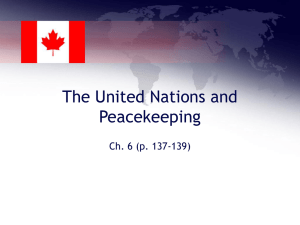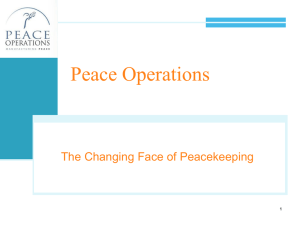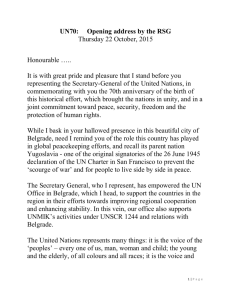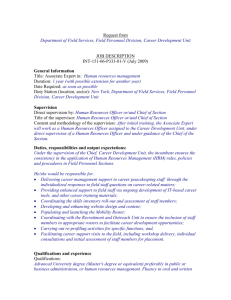*** 1 - University of Nottingham
advertisement
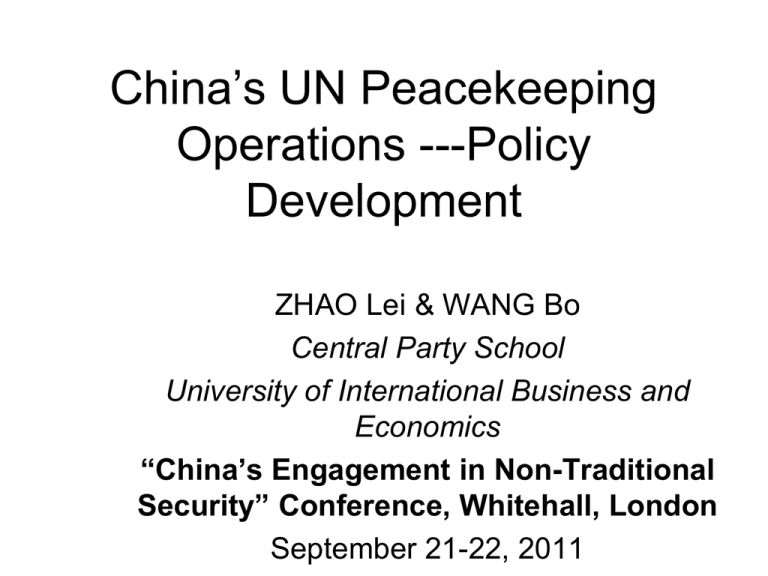
China’s UN Peacekeeping Operations ---Policy Development ZHAO Lei & WANG Bo Central Party School University of International Business and Economics “China’s Engagement in Non-Traditional Security” Conference, Whitehall, London September 21-22, 2011 Outline • The evolution of China’s policy toward UN and UNPKO • Understanding China’s policy towards UNPKO from the Grand Strategic Perspective • The Direct Interests China vested in participating in UNPKO • The Trends of China’s participation of UNPKO and constraints I.The Evolution of China’s attitudes toward UN Peacekeeping • Opposition (the Korean War),1950-1971 • Acquiesces (non-vote)1971-1982 • Flexible(began to share UNPM budget) 1982: • Active(paid $4.4 million in 1986) • Strong Support. • UNPKM budget share • China 3.939% from 2010-2012(increased from 3.1474% the previous term, with total $ 220 million) compared with U.S. 27%、Japan19%、 Germany, France, & Britain7%,China and the Netherland 2%. China’s contribution to the UN China’s share of UN budget • 1971: 4% • 1974: 5.5% • 1995: 0.72% • 2004: 2.053% • 2007-2009: 2.667% 2010-2011: 3.189% • China’s payment to UN peace-keeping budget increased from zero in 1981 to 3.147% to in 2009 to 3.939 % from the year of 2010 • China has participated in 24 UN peace-keeping operations, dispatched a total of more than 10,000 peacekeeping personnel, making China an important actor of international system. • In 2001 and 2002, only about 100 Chinese peacekeepers served in UN missions, significantly fewer than the other UNSC permanent members(P-5). However, from Mar. 2004 to Aug. 2006, China historically became the largest contributor. Since Sept. 2006, China and France have ranked as the biggest contributors of personnel to UNPKO, leaving the other three P-5 countries far behind. II . Understanding China’s policy towards UNPKO from the Grand Strategic Perspective (1) 1, Confrontation between Isolated China and International System: (1949-1971): Different relations within bipolar systems East-Soviet block vs. West Capitalist block: different institutions different process cooperate within and confront without II . Understanding China’s policy towards UNPKO from the Grand Strategic Perspective (2) China’s different relations with the two systems Leaning to one side: supported by and allied with the Soviets led socialist camp: Anti-imperialist diplomacy: unrecognized, embargoed, and contained by, and against the U.S. led capitalist camp, opposed the UN as the instrument of the U.S. The foreign policy of isolated China which was excluded from the UN was referred as revolutionary diplomacy in the West. China’s Share In World Trade selected years 1953-1977 Year World trade Volume (US$ billion) Share in World Trade(%) 1953 2.37 1.5 1957 3.11 1.4 1959 4.38 1.9 1962 2.66 0.9 1970 4.59 0.7 1975 14.75 0.8 1977 14.80 0.6 II . Understanding China’s Policy towards UNPKO from the Grand Strategic Perspective (3) 2,From a transformer to a participant and reformer (1979-1989) :Opening up and joining the world: • The year of 1978 is a turning point in China’s history. China began to practice an “opening up” policy, which was carried out gradually from the coast areas to the interior of China. • China revised its domestic laws to allow and encourage foreign investment. • China began to accept foreign aid from international organizations. In economic terms: China’s contribution to world economic growth has surpassed more than 10%, and has become a locomotive for global economic growth. China’s behavior during the Asia financial crisis in 1997-1998 and the crisis in 2009 have all helped stabled the economy and played global recognized constructive role in leading the regional or world economy out of recession. • While “inviting in”, China took an active step of “going out” by actively participating in the international institutions, starting the process of integration into the international system. • In the realm of economy. – China joined World Bank and International Monetary Fund (IMF) in 1980, – resumed its observer status in the General Agreement and Tariff and Trade (GATT) in 1982, and formally applied for the restoration of its contracting party status in GATT in 1986 – 15 years of negotiations for its official accession to the WTO in 2001 was a process for China to liberalize its foreign-trade system to meet international norms by » Reducing its tariff barriers » Abolishing import quotas » Improving laws and laws enforcement system • In the Security realm, China began – to participate in the Conference on Disarmament in Geneva and its affiliated special committees and working groups in 1980. – to adopt a positive attitude towards the role of UN peacekeeping operations in 1981. – To pay its due to UN peace-keeping operation in 1982 and became a member of the UN Special Committee on Peacekeeping Operations in 1988. • By the end of 1986, China had joined UN and all of its affiliated multilateral organizations • The Report on the Work of the Government to the NPC stated for the first time in 1986: • “China supports the work undertaken by the UN in the spirit of the Charter and participates in activities for world peace and development sponsored by the organization and its specialized agencies. China has joined a wide range of international organizations, actively engaged in multilateral diplomacy and strived to promote international cooperation in all fields.” Signaling a change in China’s attitude in policy to multilateral international mechanisms represented by UN. 1, The scope of China’s participation in Intl. Regimes: some facts Status Time: 1977 1989 2009 IGO’s NGO’s Int’l Regimes 21 71 45 37 677 157 130+ thousands 300+ Global: UN、 WTO, G8+5, G-20 Trans-regional: APEC、ASEM, FOCAC, BRIC Regional: SCO、ARF 、10+3 10+1 From Passive applicant to active advocate and initiator: SCO & Six-party talks, the Bao’ao Forum. III. China’s Interests & Motivations in UNPKO (1) • 1.Participation in UNPKO has served to shape China’s international image as a “peaceloving state” instead of “an emerging threatening giant”. • Maintaining peace fits Chinese Traditional Value for Peace: He Wei Gui. Dai Shaoan, vice-director of the Peacekeeping Office: ‘Wherever they go or whatever they do, [Chinese peacekeepers] always bear in mind that they are messengers of peace, representing China […]. To win hearts and minds, you need to devote your own hearts and minds, and that is exactly what our peacekeepers are doing”. Does the Chinese Government Have ‘Global Responsibility’? (Selecting One Answer)Analysis on 389 valid questionnaires UNCERTAIN, 69 (18%) NO, 71 (18%) YES, 249 (64%) What is China’s Primary National Identity? (Selecting One Answer) Analysis on 389 valid questionnaires a Responsible Great Power, 119 (31%) a Regional Power , 57 (15%) Uncertain, 8 (2%) a Socialist Country, 12 (3%) the Largest Developing Country, 186 (47%) a World Superpower, 7 (2%) China’s Interests and Motivations in UNPKO (2) • • 2. Participation in UNPKO has served to bolster China’s relations with host countries as well as with Washington and other Western governments. On 30 June 2008, former US Secretary of Defense, William Perry, met Xu Caihou, proposed that ‘the two armed forces should enhance cooperation on humanitarian operations and peacekeeping missions.’ On 28 January 2010, Chinese peacekeeping police and US troops carried out their first joint patrol in Haiti. Both US and China sent teams to UN Stabilization Mission in Haiti (MINUSTAH) the most developed Western country and the largest developing country have common interests in the maintenance of world peace. The increasing military contacts in peace operations provide lines of communication to promote military transparency and political understanding so as to reduce the possibility of accidental confrontations. China’s Interests and Motivations in UNPKO (3) • 3. Participation in UNPKO has served to expose the military and police force to the international community which is a precious experience to them as who are an ideologically more conservative group in an increasingly openingup China. Upon their return, there will be spillover effects upon their colleagues either in the military or police which will eventually facilitate the process of China’s transformation from an authoritarian state to a more democratic one. China’s Interests and Motivations in UNPKO (4) • 4. Participation in UNPKO has served to protect Chinese interests abroad. • With the growing globalization of its interests, public and private, China needs stable overseas markets for securing a sustainable development. As some observers note, ‘China is in increasing need for natural resources in order to sustain its role as the workshop of the world and requires stable markets where it can afford its products’; ‘Instability in […] energy producing parts of Africa and the Middle East is clearly not in China’s interests. • Chinese peacekeepers have witnessed the remarkable strides of China’s ‘Going Abroad’ strategy (zouchuqu zhanlue ‘走出去’战略) since the late 1980s What are the National Interests that China Achieves in UNPKO? (Selecting 3 Answers) Based on 359 valid questionnaires 350 35.00% 300 30.00% 250 25.00% 200 20.00% 150 15.00% 100 10.00% 50 5.00% 0 Number Percentage Setting up an Enhancing the Image of a Great Army's Combat Responsible Power Capacity Boosting the Building a Bilateral Relations harmonious World with Host Country Promoting Improving China's Ensuring the Communication Capacity of Global Energy Supply with Foreign Armies Governance 325 45 244 84 64 58 257 30.18% 4.18% 22.66% 7.80% 5.94% 5.39% 23.85% 0.00% What should China Cherish the most in UNPKO? (Selecting Three Answers) Analysis on 363 valid questionnaires 350 35.00% 300 30.00% 250 25.00% 200 20.00% 150 15.00% 100 10.00% 50 5.00% 0 Number Percentage Safety of Peacekeeper Opportunity to Familiarize with Internatinonal Affairs Peace in Peacekeeping Region Good Relations with Host Country Good Comments from International Community Accumulation of Battlefield Experience Energy Supply in Peacekeeping Region 322 109 273 152 129 72 32 29.57% 10.01% 25.07% 13.96% 11.85% 6.60% 2.94% 0.00% 5 What are the Advantages of Chinese Peacekeepers (Chose 3 of the Answers) Based on 352 valid questionnaires 300 30.00% 250 25.00% 200 20.00% 150 15.00% 100 10.00% 50 5.00% 0 Number Percentage Abundant Human Resources No Direct Interest Conflicts in World Strategic Areas Strong Government Support High Reputation of Discipline and Proficiency Diligence, and Unique Attraction of Adaptabiltiy to Hard Confucianism Conditions Non-interference in Internal Affairs of Host Countries 101 211 56 228 25 171 264 9.56% 19.98% 5.30% 21.59% 2.38% 16.19% 25.00% 0.00% • IV. The Trends of China’s participation of UNPKO and Constraints China is playing an increasingly confident but still cautious role • 1. China began to consider sending combating troops to UNPKO. On 20 November 2009, Wei Yanwei, vice-director of the Peacekeeping Office of China’s Ministry of National Defence, avowed that if the UN should request the sending of combat units, the Peacekeeping Office would timely submit the recommendations to the military and national decision-makers. Wei added that, concerning the possibility of sending combat units, China would take into account its national defence policy and the response of the ‘international community’, as well as the wishes of host countries Challenges China’s UNPKO Principles face • Should UNPKO always adhere to the Consent principle? • Should UNPKO always adhere to the Neutrality principle? • Should UNPKO always adhere to the Non-use of Force Principle? • Surveys have found that Chinese intellectual community has gradually shifted from the Chinese government traditional principles. The Attitudes towards the Three Principles of Peacekeeping Operations (Based on 389 valid questionnaires) Should UNPKO always adhere to the Consent principle? Should UNPKO always adhere to the Neutrality principle? Should UNPKO always adhere to the Non-use of Force Principle? Choices Number Percentage Number Number No 139 35.73 293 75.32 186 47.81 Yes 168 43.19 44 11.31 155 39.85 Not Sure 82 21.08 52 13.37 48 12.34 Percentage Percentage When is the Best Time to Deploy Peacekeeping Operations? (Selecting One Answer) 200 150 100 50 0 Number Percentage Before Conflict During Conflict After Conflict It Depends 177 34 14 164 45.50% 8.74% 3.60% 42.16% 50.00% 45.00% 40.00% 35.00% 30.00% 25.00% 20.00% 15.00% 10.00% 5.00% 0.00% Key factors shaping China’s future role in UNPKO • Growing stakes in foreign countries, particularly in developing countries will make China’s participation an irreversible course. • International response would play a key external factor in Chinese decision to send combating troops in UNPKO or increase of the personnel and financial contribution. There is a big open space for China to play as it ranks only the 15th personnel contributor. • As China assumes a larger responsibility in UNPKO, casualty and its consequent political risks at home will play a growing role in Chinese decision-making in a growing civil society which increasingly values individual life. The Classification of Sacrifice Causes of Chinese Peacekeepers Due to Disease, 2 (13%) Due to Car Accidcent, 2 (13%) Due to Attack, 4 (25%) Due to Natural Disaster, 8 (49%) THANK YOU! leistone2003@yahoo.com.cn bowang@UIBE.edu.cn
